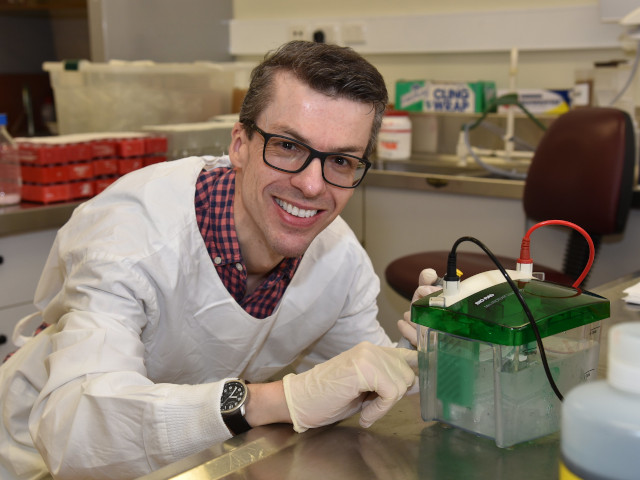Zinc therapy COVID19

Zinc therapy could help recovery of COVID-19 patients
While zinc is widely used as an antiviral dietary supplement, a CQUniversity adjunct professor believes zinc ions could also potentially be used to successfully treat COVID-19 patients in the future.
CQUniversity's Professor of Infectious Disease Immunology Andrew Taylor-Robinson has just published a paper in the most cited plant sciences journal, Frontiers in Plant Science, where he proposed the novel use of Zn2+ chlorophyll derivatives to treat viral infections, including COVID-19 that is caused by the coronavirus SARSCoV-2.
He said the therapeutic potential of Zn2+ chlorophyll derivatives to treat human pathogens such as SARSCoV-2 has not yet been explored, but evidence from other medical disciplines suggests it has the potential to inhibit viral replication.
Current understanding of the properties of zinc pheophorbide has been derived from cancer research where there has been reported success in laboratory studies and in clinical trials.
"The rapid uptake of zinc pheophorbide (ZnPh), a breakdown product of chlorophyll, and consequent release of Zn2+ ions has been shown to have a beneficial therapeutic effect on human adenocarcinoma cell lines – a type of cancer that forms in mucus-producing glandular cells – through inhibiting viral replication," Professor Taylor-Robinson explained.
"We propose that a similar approach could be adopted to target SARS-CoV-2-infected lung epithelial cells in vitro.
"This would pave the way for future clinical therapy to be delivered deep inside human lungs, offering a potential treatment for symptomatic COVID-19 patients."
Professor Taylor-Robinson said his research to date suggests that zinc ion therapy may provide a safe, novel therapeutic option for the treatment of severe clinical manifestations of COVID-19.
"We know that ZnPh is non-toxic to humans and that there is a strong likelihood that the compound offers great potential to act as a carrier molecule for zinc ions to trigger an anti-viral response in COVID-19 patients.
"It is increasingly clear that the COVID-19 global pandemic is not leaving us any time soon, so effective treatment of severe, hospitalised cases of infection is urgently required.
"While our investigations are very much at a preliminary experimental stage, we're suggesting that further research into this potential COVID-19 therapy be pursued."
Professor Taylor-Robinson co-authored the paper COVID-19 Therapy: Could a Chlorophyll Derivative Promote Cellular Accumulation of Zn2+ Ions to Inhibit SARS-COV-2 RNA Synthesis? with Nicole Clark from the University of Canberra.
CQUniversity's Professor of Infectious Disease Immunology Andrew Taylor-Robinson has just published a paper in the most cited plant sciences journal, Frontiers in Plant Science, where he proposed the novel use of Zn2+ chlorophyll derivatives to treat viral infections, including COVID-19 that is caused by the coronavirus SARSCoV-2.
He said the therapeutic potential of Zn2+ chlorophyll derivatives to treat human pathogens such as SARSCoV-2 has not yet been explored, but evidence from other medical disciplines suggests it has the potential to inhibit viral replication.
Current understanding of the properties of zinc pheophorbide has been derived from cancer research where there has been reported success in laboratory studies and in clinical trials.
"The rapid uptake of zinc pheophorbide (ZnPh), a breakdown product of chlorophyll, and consequent release of Zn2+ ions has been shown to have a beneficial therapeutic effect on human adenocarcinoma cell lines – a type of cancer that forms in mucus-producing glandular cells – through inhibiting viral replication," Professor Taylor-Robinson explained.
"We propose that a similar approach could be adopted to target SARS-CoV-2-infected lung epithelial cells in vitro.
"This would pave the way for future clinical therapy to be delivered deep inside human lungs, offering a potential treatment for symptomatic COVID-19 patients."
Professor Taylor-Robinson said his research to date suggests that zinc ion therapy may provide a safe, novel therapeutic option for the treatment of severe clinical manifestations of COVID-19.
"We know that ZnPh is non-toxic to humans and that there is a strong likelihood that the compound offers great potential to act as a carrier molecule for zinc ions to trigger an anti-viral response in COVID-19 patients.
"It is increasingly clear that the COVID-19 global pandemic is not leaving us any time soon, so effective treatment of severe, hospitalised cases of infection is urgently required.
"While our investigations are very much at a preliminary experimental stage, we're suggesting that further research into this potential COVID-19 therapy be pursued."
Professor Taylor-Robinson co-authored the paper COVID-19 Therapy: Could a Chlorophyll Derivative Promote Cellular Accumulation of Zn2+ Ions to Inhibit SARS-COV-2 RNA Synthesis? with Nicole Clark from the University of Canberra.
MORE



